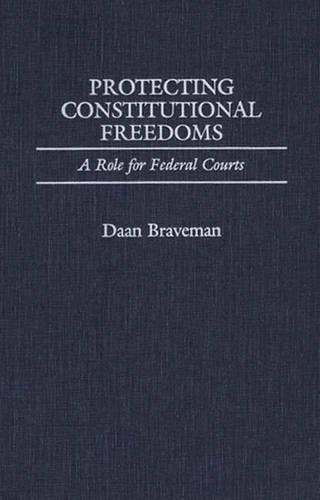
Protecting Constitutional Freedoms: A Role for Federal Courts
(Hardback)
Publishing Details
Protecting Constitutional Freedoms: A Role for Federal Courts
By (Author) Daan Braveman
Bloomsbury Publishing PLC
Praeger Publishers Inc
11th October 1989
United States
Classifications
Tertiary Education
Non Fiction
347.307203
Physical Properties
Hardback
217
Description
According to Braveman, the federal courts are being systematically closed to individuals challenging the constitutionality of the conduct of state officials. Debate over the role of the federal court system in upholding constitutional rights is not new to readers of law journals and scholarly articles. Braveman now presents this crucial issue to the general public, who will find it of grave concern. His book brings together information that has previously been available only in separate articles. Beginning with an historical overview of the emergence of the federal courts as the guardian of constitutional rights, Braveman then focuses on specific cases and doctrines to illustrate a radical change in our judicial philosophy. His book brings together information that has previously been available only in separate articles.
Reviews
. . . the protection of constitutional rights is a national issue that transcends local interests and local control. It is an issue that should be part of the business of the federal courts, including not only the Supreme Court itself but the lower courts as well.-Sage Public Administration Abstracts
Braveman contends that the preference of the Burger Court for state court adjudication of constitutional rights has resulted in the dimunition of those rights to an alarming degree. Tracing the nationalization of individual rights after the adoption of the Civil War amendments, and emphasizing the breakthrough in Brown v. Board of Education with the Court's use of the injunction to force state compliance with federal policy, Braveman maintains that the Burger Court's reduction of access to the federal judiciary through the use of technical procedures reversed the nationalization trend. Foremost among the new judicial rules were strictures on standing to sue and on the federal district courts' use of the injunction as a means of restraining state officials from engaging in unconstitutional conduct. Braveman concludes that state courts cannot protect constitutional rights as competently as the federal judiciary and that the door closing' by the Supreme Court reinforces a perception of unfairness and undermines popular confidence in evenhanded justice. This book is a clear, forthright exposition of one point of view and is recommended for all who would better understand the technicalities of access to the federal courts. To obtain a balanced picture, however, one should read the opinions of the Justices whose reasons for closing the door' are not totally without merit. Excellent documentation, bibliography, and index.-Choice
Braveman has managed to transform a great deal of difficult, technical case law into a clear and readable exposition of a dangerous trend begun by the Burger Court and continued by the Rehnquist Court. Protecting Constitutional Freedoms comprises an important contribution to the literature. . . .-Political Science Quarterly
." . . the protection of constitutional rights is a national issue that transcends local interests and local control. It is an issue that should be part of the business of the federal courts, including not only the Supreme Court itself but the lower courts as well."-Sage Public Administration Abstracts
"Braveman has managed to transform a great deal of difficult, technical case law into a clear and readable exposition of a dangerous trend begun by the Burger Court and continued by the Rehnquist Court. Protecting Constitutional Freedoms comprises an important contribution to the literature. . . ."-Political Science Quarterly
"Braveman contends that the preference of the Burger Court for state court adjudication of constitutional rights has resulted in the dimunition of those rights to an alarming degree. Tracing the nationalization of individual rights after the adoption of the Civil War amendments, and emphasizing the breakthrough in Brown v. Board of Education with the Court's use of the injunction to force state compliance with federal policy, Braveman maintains that the Burger Court's reduction of access to the federal judiciary through the use of technical procedures reversed the nationalization trend. Foremost among the new judicial rules were strictures on standing to sue and on the federal district courts' use of the injunction as a means of restraining state officials from engaging in unconstitutional conduct. Braveman concludes that state courts cannot protect constitutional rights as competently as the federal judiciary and that the door closing' by the Supreme Court reinforces a perception of unfairness and undermines popular confidence in evenhanded justice. This book is a clear, forthright exposition of one point of view and is recommended for all who would better understand the technicalities of access to the federal courts. To obtain a balanced picture, however, one should read the opinions of the Justices whose reasons for closing the door' are not totally without merit. Excellent documentation, bibliography, and index."-Choice
Author Bio
DAAN BRAVEMAN is Professor of Law at Syracuse University College of Law. After earning a law degree from the University of Pennsylvania, he was law clerk for Justice Samuel J. Roberts, Supreme Court of Pennsylvania, and staff attorney for the Greater Upstate Law Project, Rochester. He is coauthor of Constitutional Law: Structure and Rights in Our Federal System and author of many articles on constitutional law and federal courts.
